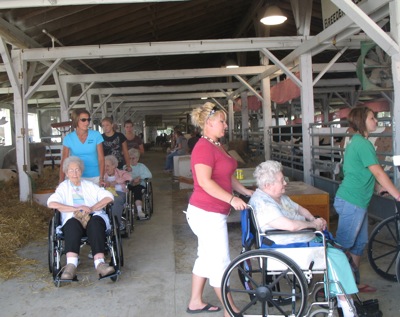Wednesday, August 13th, 2008
Whooping cough cases worry health officials
By Shelley Grieshop
Local health officials are concerned about a recent increase in cases of whooping cough - a disease that can be deadly, especially to infants and young children.
"We've had eight cases" since March, said Joyce Jansen, infectious disease nurse at the Mercer County-Celina City Health Department. "We've had so many in such a short time and I believe there could be more that we don't know about. It's a growing concern."
Jansen said she's not sure why there's been a sudden rise in cases.
Health officials in Mercer and Auglaize counties said they typically handle an average of three whooping cough cases per year. Auglaize County recorded only one case this year in June, but it has been linked to a case in Mercer County.
Whooping cough, also known as pertussis, is a serious respiratory infection that spreads easily from person to person usually through airborne contact. It can cause coughing spells (with a distinct, high-pitch "whooping" sound) so violent that a person can crack a rib or have difficulty breathing. It also can progress to pneumonia, seizures, apnea, weight loss, vomiting and death. A full recovery includes antibiotics and can take months.
Two of the eight cases confirmed in Mercer County involved a toddler and a teenager who were never disease vaccinated. Vaccinations are recommended by the Centers for Disease Control (CDC). The vaccine, which is given in a series to babies and offered again as a booster for teens and adults, doesn't offer 100 percent protection, Jansen admitted. However, those without the vaccine typically have more serious cases of the illness if contracted, she added.
So far none of the victims have been hospitalized, however, a 15-month-old child relapsed after initial treatment and remains under the care of a physician. Victims in both counties have ranged in age from babies to grandmothers.
Jansen said she's sure there are more "suspect cases" out there.
"It's very hard to confirm," she explained.
Tests for pertussis are more easily confirmed by a blood test during the first week or two after a patient shows symptoms; this also is the most contagious time. Unfortunately, the initial symptoms - sneezing, nasal congestion, fever and a mild cough - are quite similar to the common cold. Subsequently, most adults hesitate to take themselves or their children to a doctor that quickly, Jansen explained.
"A high percentage of children will have positive cultures in the first week of illness but only 50 percent will be positive by the end of the third week," she said. "Less than 20 percent are positive after the fifth week."
Jansen fears the public may not be taking the proper precautions if they don't suspect pertussis as the cause for an irritating cough. She wants to educate people on the disease without inducing panic in order to stop its spread, she said.
"I know people tend to go on the Internet to get information, but they don't always look for reputable sources" such as the CDC or Ohio Department of Health, Jansen said.
Washing hands and covering the mouth when coughing and sneezing can help prevent the spread of pertussis, she said.
Pertussis isn't uncommon in the general public, but health officials have noted a definite increase in Ohio and across the U.S. since the '80s, Jansen said. Ohio confirmed 488 cases this year; 462 cases were reported at this time last year. In the U.S., 5,621 cases were reported in 2007 and 4,057 to date since January.
Adults often come down with the illness after it is passed on to them by young children or vice versa. It can be spread easily by spending as little as an hour in close contact with a carrier.
Jansen advises anyone with an ongoing, annoying cough to see a medical professional. She and other health officials also urge parents and children to get all recommended vaccinations.
"It's a different world today than it was 20 years ago, people travel all over the place. Afghanistan, Pakistan, India ... they're known for their polio cases. People go there all the time and come back. It's scary," she said. "There's just too much out there, so we have to do whatever we can to prevent it from coming here."
Pertussis and vaccines:
In the 20th century, pertussis (whooping cough) was one of the most common childhood diseases and a major cause of childhood deaths in the U.S.
Before the availability of pertussis vaccine in the 1940s, more than 200,000 cases were reported annually.
Since widespread use of the vaccine began, incidence has decreased more than 80 percent. However, pertussis cases are still common and have been on the rise the last three decades.
Health officials believe immunization against the disease, which can be deadly, is the best way to control it and reduce the seriousness of the cases. The DTap (diphtheria, tetanus, acellular pertussis) vaccine is recommended for babies at ages 2, 4 and 6 months and 15 to 18 months, followed by a booster between 4 and 6 years old.
Tdap vaccines for pertussis are available for adolescents and adults and are particularly recommended to parents, caregivers/baby sitters or others with longterm contact with children. Through grant funding, Mercer and Auglaize County health departments can offer the vaccines to qualifying residents for $7 or $8 (depending on the county) instead of the normal cost of $42 and $43.
Although serious complications can occur from vaccinations, officials believe the risk of contracting and spreading the disease is greater.
- Shelley Grieshop
